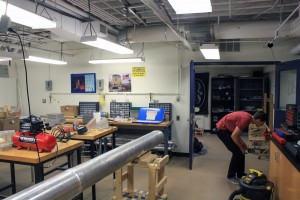
The Boston University Rocket Propulsion Group is preparing to launch a 1,100-pound, 30-foot rocket into space by summer 2015. If they succeed, BURPG would be one of the first student groups to accomplish the feat, and they would break an additional four world records in the process.
Seven aerospace engineers founded BURPG in 2003. The group has been working on small projects ever since, but in 2012, they set their sights on sending the hybrid-fuel rocket, Starscraper, space-bound, said BURPG’s Chief Electronics Engineer Drew Kelley.
“We had no idea what we were going to do or how we were going to do it,” said Kelley, a 2014 graduate of the College of Engineering. “We decided to start small and incrementally build up to bigger and bigger rockets. Our plan of attack changed a few times over the three years, but it’s essentially been the same three-year campaign that we always planned.”
BURPG could potentially be the first amateur student group rocket to visit space. If Starscraper’s flight is successful, it will reach the highest altitude achieved by a hybrid rocket and the highest flight ever by an amateur vehicle of any kind. Additionally, it will be the first amateur rocket in space using liquid fuel and the first amateur-controlled rocket in space, according to the BURPG website.
Since 2012, the group has developed three different rockets and performed a number of test launches to ensure that Starscraper will climb 450,000 feet into the sky.
“I wanted to do something that everybody thought was impossible,” said Armor Harris, director of BURPG and a senior in the College of Engineering. “I wanted to create something where students could get an experience that they couldn’t get anywhere else and that they wouldn’t ordinarily get unless they were 10 years into their career or a doctoral student.”
BURPG receives funding from sponsors within the BU community, including the College of Engineering and the Student Activities Office. They also receive funding from external sponsors such as GE Aviation and Raytheon, a defense and aerospace systems company.
BURPG’s target budget for 2015 is $100,000, and in order to raise the funds they need, they have partnered with Mavericks Civilian Space Foundation, a nonprofit organization that promotes Science, Technology, Engineering and Mathematics education.
BURPG plans to run a large-scale motor test on Starscraper in November. In spring 2015, they will begin their hot fire test campaign, and in August 2015, the group hopes to launch Starscraper from a site in Nevada’s Black Rock Desert.
BURPG is in close competition with the University of Southern California Rocket Propulsion Lab to create a space-bound rocket. USCRPL has been working on a similar project for 10 years, and they are preparing to launch their solid-fuel rocket, Traveler 3, in spring 2015 as well, said Brandon Edelson, the group’s CEO.
The design of USCRPL’s rocket differs from BURPG’s, Edelson said. It is significantly smaller in size — only eight inches in diameter and 13 feet long — but is still expected to reach an altitude of 400,000 feet, he said. USCRPL has attempted to launch two rockets into space, but both attempts failed.
“This is exactly what we want,” Edelson said. “We want to see people getting excited about this student space race. These groups are pushing beyond what people ever believed was possible to accomplish at a student level.”
The group has over 30 active members, some of whom spend up to 90 hours a week working in the group’s lab.
“It’s definitely a big commitment for anyone who’s involved,” Kelley said. “I can say, without a doubt, that the only reason I got a job was because of this program. BU is great in that it teaches you a lot of theory and does some hands-on stuff, and all around, it’s a great education, but projects like what we are doing really give people a more in-depth exposure to engineering.”
ENG sophomore Matthew Owney, who clocks in an average of eight hours a day in the lab, said it would be incredible to see Starscraper make it to space.
“It would be the coolest thing in the world and the greatest achievement of my entire life,” he said.
Alessandro Gomes, a junior in ENG, said participating in BURPG is an irreplaceable experience.
“Everyone who comes to BU and who wants to be an engineer should experience the rocket team,” he said. “We are one of the most advanced student groups in the United States and one of the most advanced engineering student groups.”
























































































































Daniel O'Donnell • Oct 2, 2014 at 5:18 pm
Very cool. In this case we ARE talking rocket science.
I am all for sending robots, telescopes, transmission devices into space for exploration – where needed – and I mean needed – send people. We don’t need people on Mars (in my humble opinion) – but sending robots to Mars or other places in the solar system – to comets, to other moons, etc. is very exciting.
I will tell my friends, oh, by the way, did you year BU students are working on sending a rocket into space?
Thanks for the info!